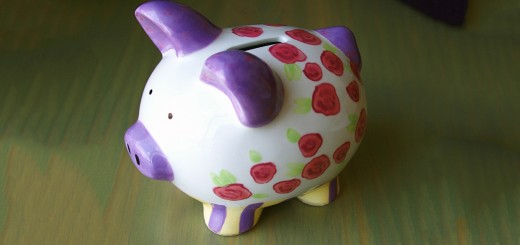The Paradox of Thrift

We all want to be thrifty, don’t we? It helps us become financially independent more quickly. But what if everyone was thrifty? Today we look at the paradox of thrift.
Contents
Saving – good or bad?
Most people in the personal finance / FIRE community are clear that saving is a good thing.
- It defers consumption until our retirement.
- It brings the date of our retirement ever closer.
But if thrift is a virtue for the individual, can too much saving be a bad thing for the economy as a whole?
The way that capitalism and the consumer society is set up, some level of spending is needed to keep the economy going, providing people with jobs and the government with tax revenue to spend.
Paradox of Thrift
The Paradox of Thrift – made popular by John Maynard Keynes during the Depression of the 1930s ((The idea dates back at least to The Fable of the Bees: or, Private Vices, Publick Benefits, in 1714 )) – is that individuals will try to save more during a recession, since they expect bad times ahead, and that this is not a good thing.
Saving reduces spending. Since one person’s spending is another person’s income, this reduction in demand leads to a fall in GDP growth, and hastens / deepens the recession. ((A similar argument has been used by Keynesians against the “Austerity” measures used by most Western government since the 2008 financial crisis ))
Prisoner’s Dilemma
In one sense, the paradox of thrift is similar to the Prisoner’s Dilemma. The person who does the “bad” thing – cutting a deal in the prisoner’s dilemma, saving in the paradox of thrift – is rewarded, but at a cost to the wider society.
The difference here is that not only is the increased saving rational, it is often praised as good behaviour. But not during a recession.
Fallacy of composition
The paradox of thrift is a fallacy of composition – that what is true of the parts must be true of the whole.
In this case, the untrained observer would assume that since saving will be good for the individual, it would be good for the economy as a whole.
But this is not necessarily the case.
Unemployment
Back to the paradox.
When spending falls, businesses can’t make as much profit as they did last year, and so they lay off workers.
This leads to an increase in unemployment (and welfare payments) and a reduction in tax receipts, making it more difficult for the government to balance its budget.
- Unemployed people spend even less than those in work.
Thus an increase in saving can produce a reduction in total savings.
At the limit, people still have to eat and keep their homes warm, so the decline in consumer spending is not quite so steep as the decline in income.
This is bad for investors, too, as investments can be expected to produce lower returns under these circumstances.
The potentially interesting – but often difficult to resolve – debate is the chicken-and-egg of which comes first – the reduction in consumer spending or the increase in unemployment.
Government investment
The Keynesian answer to all this is for the government to intervene, spending money – usually on infrastructure projects – to boost jobs and the economy.
- This is “direct investment”, and can hardly fail to boost the economy in the short-term.
There hasn’t been much of this in response to the 2008 crisis, despite record low interest rates making such investments cheap for governments.
- The recent crash in commodities prices even means that material costs for infrastructure work are low.
Governments might also incentivise pension schemes – particularly public-sector ones – to invest in infrastructure.
- This is just beginning to happen here in the UK, with plans to merge public pensions into regional investment funds announced in this year’s Budget.
But administrations have to date largely focused on QE, which amounts to transfer payments to banks.
Does everyone agree about this?
By no means.
Non-Keynesians would argue that if it exists, the paradox of thrift is a short-run thing. In time, increased saving will lead to higher bank deposits and lower interest rates, which should allow banks to lend more (if they can find any one who wants to borrow).
This increased lending – if it happens – could translate directly to increased spending, which should fix the problem, assuming that the economy can benefit from increased levels of investment capital.
Alternatively, the money might be invested by companies in factories and equipment, plus the hiring of new workers to operate them.
- In time, this should have a beneficial effect on the economy.
Note though, that this is of course spending, and means that lower household spending has been counteracted by increased business spending.
So nothing to worry about?
The problem with the business spending solution is that faced with slowing demand, many businesses will choose not to borrow, and not to invest. This would maintain the recessionary trend.
- Low – and now negative – interest rates should help, though not so much when inflation is low.
- And even less so after a credit crush, when most banks would rather repair their balance sheets – and indeed are forced to by increased regulation – than lend out the money they receive from the government (eg. through QE).
This certainly seems to be the case over the past eight years:
- banks have held on to the cash
- and businesses and households have developed a “liquidity preference”, investing in financial assets rather than illiquid and risky projects
And yet the widely reviled “austerity” measures used by George Osborne do not seem to have affected the UK economy that badly.
- Employment is high
- and the deficit has been cut in half.
With wage growth weak, the tax cuts to the high-spending poor (through the massive increase to the personal allowance) probably have something to do with it.
- Of course this is a once-only boost – the personal allowance isn’t going to rise to £20 in the next few years.
Other Criticisms
Neo-classical economists say that as demand falls, prices (and therefore possibly wages) will fall until demand is stimulated.
This is probably the case eventually – all recessions end after all – but sticky prices (especially sticky in the face of downward pressure) means that this process can take longer than theory would suggest.
International aspects
The paradox tends to assume that a country’s economy is closed, and that foreign investment can’t be used to take up the slack from shrinking domestic demand.
- But that in turn assumes that there is something that they want to invest in.
In addition, more domestic saving should also lead to less foreign capital coming into a country, which should depreciate the currency, boosting exports but harming imports.
Demographics
Some people argue that as countries age and shrink, they will need less investment anyway.
- But while it is true that a shrinking population won’t need more houses, so that investment in house building can be reduced, the opposite applies to productivity.
- As the ratio of productive workers to non-producing dependants falls, each remaining worker needs to be ever more productive, and should require more capital.
- At the end of the process, these two effects – more capital per worker and fewer workers – should roughly cancel out, but in the early stages more investment is likely to be needed.
So demographics offers a little comfort, but not so much as might be expected.
Deflation
The big concern with the paradox of thrift is that a multiplier effect can lead to a downward (deflationary) spiral.
- As the economy slows, so does inflation.
- The fear is that prices would start to go into reverse.
Deflation would increase the tendency to save, as anything you bought would be cheaper to buy in the future.
- So purchases would be delayed.
Once established, deflation can last a long time and be difficult to shift.
- The last two decades in Japan are the best recent example of this.
Tricks like a temporary cut in VAT (as happened in the UK during 2009) can be used to attempt to stimulate demand by making it clear that prices will go up at the end of the period.
Rational expectations
Keynes’s theories fell from favour as “rational expectations” came into vogue.
- The idea here is that if the government borrows to invest in say infrastructure, the public will realise that this debt needs to be paid back in the future.
- Expecting tighter times ahead, they will save now for this rainy day.
- People living very close to their means won’t have any money to save, so there is a bit of a drag at the bottom end.
And there’s plenty of behavioural psychology to suggest that people aren’t very good and working out the long-term effects of government spending.
Helicopter money
Which brings us to helicopter money.
Originally a thought experiment involving actual cash being dropped from the air, in practice it would likely take the form of a time-limited voucher or credit card being given to every household.
- At the top end of the income spectrum, this would largely displace existing planned spending (an extra £1K is easy to blend in over six months for a household spending £3k to £5K a month already).
- But the poor might be expected to use a significant amount of this as extra spending, boosting the economy.
It hasn’t happened yet, but Janet Yellen confessed only this month that she hadn’t ruled it out.
Saying thank-you to the Joneses
What does all this mean for the individual?
As prudent savers and long-term planners, we’re always told not to worry about the Joneses.
- Spending to keep up with your peer group is the route to spending too much on crap you don’t need and not saving enough for your future.
But the way that society is currently structured, somebody has to do the spending. ((Interestingly, this is one of the challenges for society as it moves to a model where labour is displaced by capital in the form of software automation and robotics – how do you get a robot to buy things, and if they won’t, who will? ))
- So the next time you spot the Jones, smile, and give silent thanks.
If we want to save for the future, someone else has to spend for the present.
Until next time.

